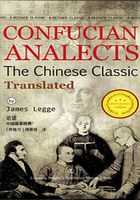
CHAPTER 2
1. The philosopher Yew said, "They are few who, being filial and fraternal, are fond of offending against their superiors. There have been none, who, not liking to offend against their superiors, have been fond of stirring up confusion.
2. "The superior man bends his attention to what is radical. That being established, all practical courses naturally grow up.
2. FILIAL PIETY AND FRATERNAL SUBMISSION ARE THE FOUNDATION OF ALL VIRTUOUS PRACTICE. 1. Yew, named 若, and styled 子有, and 子若, a native of 鲁, was famed among the other disciples of Confucius for his strong memory, and love for the doctrines o antiquity. In personal appearance he resembled the sage. See Mencius, III. Pt.II.iv.13. 有子 is 'Yew, the philosopher', and he and Tsăng Ts'an (or sin) are the only two of Confucius' disciples who are mentioned in this style in the Lun Yu. This has led to an opinion on the part of some, that the work was compiled by their disciples. This may not be sufficiently supported, but I have not found the peculiarity pointed out satisfactorily explained. The tablet of Yew's spirit is now in the same apartment of the sage's temples as that of the sage himself, occupying the 6th place in the eastern range of 'the wise ones'. To this position it was promoted in the 3d year of K'een-lung of the present dynasty. A degree of activity enters into the meaning of 为 in 为人,='playing the man', 'as men, showing themselves filial',&c. 弟, here=悌, 'to be submissive as a younger brother', is in the low 3d tone. With its proper signification, it was anciently in the 2d tone. 而='and yet', different from its simple conjunctive use='and', in the prep. ch. 好, a verb, 'to love', in the up.3d tone, different from the same char. in the 2d tone, an adj.,='good'. 鲜, up. 2d tone,='few'. On the idiom—未之有, see Premare's gram.p.156. 2. 君子 has a less intense signification here than in the last chap. I translate—'The superior man' for want of a better term. 本, 'the root', 'what is radical', is here said of filial and fraternal duties, and 道, 'ways' or 'courses' of all that is intended by 为 (= 行) 仁, below. The particles 也者 resume the discourse about 孝弟, and introduce some further description of them. See Prem., p.158. 与, in the lowest first tone, is half interrogative, an answer in the affirmative being implied. 仁is explained here as 'the principle of love', 'the virtue of the heart'. Mencius says—仁也者人也, '仁is a man', in accordance with which, Julien translates it by humanitas. Benevolence often comes near it, but, as has been said before of 君子, we cannot give a uniform rendering of this term.

Filial piety and fraternal submission!-are they not the root of all benevolent actions?"